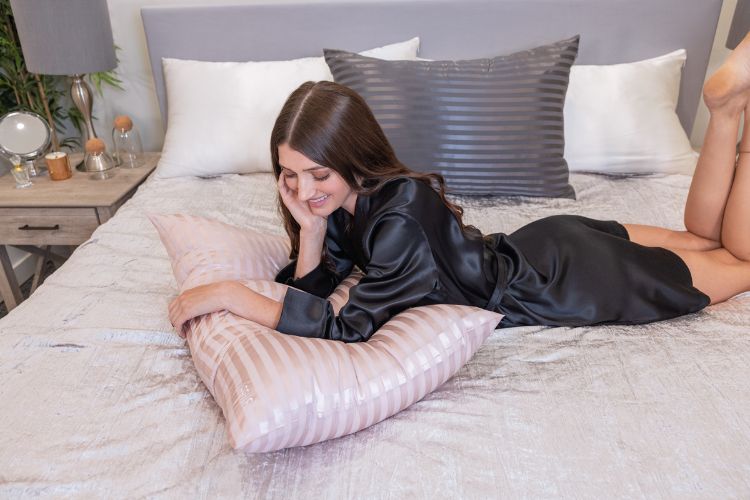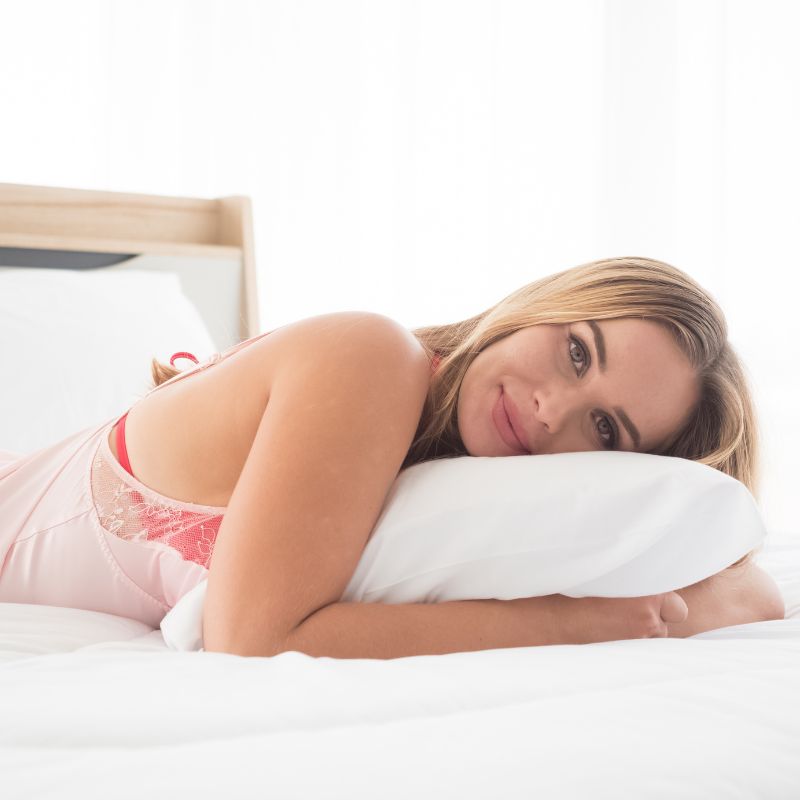Listen to an audio transcription of this post
If you feel you haven't been getting enough shut-eye lately or that the quality of your sleep has suffered? Now is a good time to go over your sleep routine and make sure it's right for you.
Maintaining a healthy nighttime routine helps you get the sleep you need. It also helps lessen anxious thoughts and other disturbances that could affect your rest period.
The Importance of a Nighttime Routine
According to the National Sleep Foundation (NSF), a good night's sleep is easier to get when you have a nighttime routine. A solid night routine helps with falling asleep and staying asleep. With a good routine, you know that when you go to bed you'll really be getting the rest you need.
The NSF states that bedtime routines help your brain separate the day and night. They let you walk away from the stress of your day (that's great for your mental health) and relax for better sleep.
Not everyone can get into sleep mode so easily, though. If that sounds like you, it's time to talk about how to improve your sleep hygiene and get your body clock working with you.
How Can I Create My Night Routine to Fall Asleep?

There are several steps you can take to create a consistent bedtime routine that will help you get enough sleep each night. Keep in mind that this is a gradual process. You'll need to develop this method of going to bed on time, at the same time, each night before it becomes second nature.
Here are a few steps to help you build the ultimate night routine that gets you to fall asleep faster for a more restful night.
Plan when it's time to wind down
One of the healthy habits to get into right away is setting aside time to wind down before bed. During this time, you should focus on getting into a positive mindset.
How early do you need to start winding down? Some people set an alarm on their phones or devices for one hour before they need to go to sleep. Some need longer than that. Try an hour at first and begin the process of getting ready for bed earlier in the evening.
During that wind-down period, you can do things like taking care of your skincare routine or focusing on positive thoughts. You can also take a bath or listen to relaxing music a couple of hours before bed to get you in the mood to go to sleep.
During the wind-down period, remember to avoid alcohol and caffeine. Both beverages can make it harder to sleep and get the sleep quality you're looking for.
Get away from your devices

The next important tip is to step away from your electronic devices. While these devices are helpful in your everyday life, they are also disrupting. The last thing you want during a bubble bath or relaxing moment is to hear your device "ping!" and take your focus off relaxation.
When it's time to go to bed, set your phone or other electronic devices to silent or do not disturb. Some devices have special settings for nighttime that let people call or message you if they're on a special list. Set that list up so you can relax knowing that you're not missing anything while you're getting ready for bed or sleeping at night.
Take a warm bath or shower
To help get your body the right temperature for sleep and to relax tired muscles, consider taking a warm bath or shower before bed.
Some people find that showering wakes them up, but warm temperatures tend to calm the body and help you get into a relaxed state easier. How much time should you spend in the bath? Usually, 15 to 30 minutes is enough to help relax your muscles without drying out your skin.
Since everyone is different, you'll need to play around with the temperature of your hot shower or bath to find the right temperature for you. The goal should be to balance your body temperature. You want to feel comfortable, not too hot or cold when you head to bed.

Practice mindfulness
Another way to get into a relaxed state is through meditation and mindfulness. Did you know that meditating for 10 minutes could help you improve your sleep?
Try meditating for just a few minutes a night while you're in bed to feel the positive effects. During that time, practice mindfulness and cultivate gratitude.
Think about the positive things in your life and be present. Breathe deeply, and allow your body to relax.
Create a sleep-friendly environment
To get to sleep, you need to have a sleep-friendly environment. With the right environment, you could find yourself falling asleep as soon as your head hits the pillow.

What makes a sleep-friendly environment? Start by looking around your bedroom. Is there anything that bothers you? Identify light sources or sounds that might irritate you, so you can eliminate them as you wind down for bed each night.
For example, if your window has light shining into it, you can consider upgrading your blinds or curtains. Blackout curtains are a great choice for those who cannot have any light in the room at night. If there are sounds that come in from outside, shut your window and consider wearing foam earplugs. If you can't wear those at night, you might consider getting a sound machine or leaving soft music on in the background.

Another thing you can do to make yourself more comfortable once you get into bed is to switch to silk bedding and pillowcases. Why? Blissy uses 100% percent mulberry silk in our pillowcases, which helps with temperature regulation. If you constantly find yourself feeling warm at night, swapping to silk may be the right choice.
Silk is also moisture-wicking, so if you sweat, you won't wake up soaked. You'll feel better waking up in a dry, comfortable space, so you can start your day off right.
A Good Night Routine Ends With Your Morning Routine
Once you get through the night, you might think your nighttime routine is over. That's not the case, though, because to have a wonderful day, you need to end your night with a morning routine, too.

Morning routines, much like night routines, are preparing you for your best experience in the next several hours. To help you wake up well, consider these ideas for tackling your morning after a restful sleep.
Get up easier with blue light
Get up easier with blue light, which indicates that it's time for a new day and works with your circadian rhythm to encourage wakefulness. Blue light can usually be set on digital clocks or phone alarms. So consider downloading an app that switches from warm to cool light in the morning hours.
Try music instead of an alarm

If waking up to an alarm puts you in a bad mood or seems to be a shock to the system, try waking up to music instead. Every night, select a gentle piece of music that you enjoy and set that as your alarm. Waking up to sounds you love will help you start the next day off on the right foot and avoid the adrenaline rush you'd get from a sudden, loud alarm.
Keep your nutrition in mind
Finally, don't forget to eat breakfast. Eating after you wake up is a good way to get your body up and running. Drink plenty of water so you can stay hydrated and alert throughout the day, too. Even if you only have time for a piece of whole wheat toast or yogurt, getting food into your system is the right way to fuel your body for the day.
How Long Will It Take to See Results?

The great news about creating a nighttime routine is that it will work wonders to help you feel well-rested and alert the next day. If you're hoping this will be a sudden and quick fix, though, it's not. You might have to wait a few days before you see any results at all.
Your sleep routine will become a habit in just a few nights, and you'll start seeing the benefits within the first week. If you aren't noting any major changes, then consider adding other changes to your routine. A small snack after dinner can help avoid hunger at bedtime. Or avoiding television after dinner can prevent you from getting riled up before bed.
Whatever you decide to do, keep track of the changes you've made. Try to keep up with them and do them the same way at the same time each night. All the things you're doing now can contribute to an excellent night of sleep (and a better day) later, so stick to the routine for a week or two before you decide if it has offered the solution you were hoping for.
Try Blissy Silk Pillowcases for a Better Night's Sleep

At Blissy, we make soft, comfortable, 100% mulberry silk pillowcases that will help you get a better night's sleep. Our pillowcases are cooling, moisture-wicking, and ultra-comfortable. They also help reduce friction against the skin and hair, so you see fewer wrinkles and less frizz.
With Blissy pillowcases, you can relax as you drift off into Slumberland. Visit our website or read more in our blog for more ideas on getting good sleep.
















































